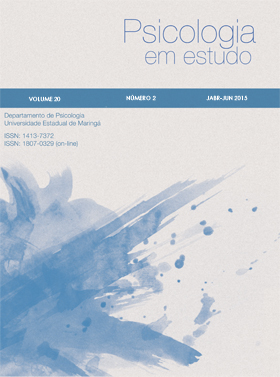BRIEF INTERVENTIONS FOR SUBSTANCE ABUSE IN LATIN AMERICA: A SYSTEMATIC REVIEW
Abstract
This study aimed to assess the literature for brief interventions in Latin America. Methods: We searched articles that were published between 2005 and 2016. Results: After removing duplicates and applying exclusion criteria, 29 studies were evaluated. The number of sessions, length, and definition of brief intervention varied across studies as well as the instruments used to assess substance use and participant characteristics. Conclusions: Even though brief interventions are adopted in many countries in Latin America, research was conducted only in 5 countries. In these countries, there was great heterogeneity on research methods, instruments and the type of brief intervention.
Downloads
References
Abreu, A. M. M., Parreira, P. M. S. D., Souza, M. H. D. N., & Barroso, T. M. M. D. D. (2016). Profile of comsumption of psychoatctive substances and its relationship to sociodemographic chracteristics: A contribution to a Brief Intervention in Primary Health Care. Texto & Contexto-Enfermagem, 25(4), 1-9.
Andrade, L. H., Wang, Y. P., Andreoni, S., Silveira, C. M., Alexandrino-Silva, C., Siu, E. R., & Viana, M. C. (2012). Mental disorders in megacities: findings from the Sao Paulo megacity mental health survey, Brazil. PloS one, 7(2), e31879.
Angst, J., Sellaro, R., & Merikangas, K. R. (2002). Multimorbidity of psychiatric disorders as an indicator of clinical severity. European Archives of Psychiatry and Clinical Neuroscience, 252(4), 147-154.
Anthony, D., Dyson, P. A., L, J., Thankappan, K. R., Champgane, B., & Matthews, D. R. (2016). Community Interventions for Health can support clinicians in advising patients to reduce tobacco use, improve dietary intake and increase physical activity. Journal of clinical nursing, 25(21-22), 3167-3175.
Babor, T. F., McRee, B. G., Kassebaum, P. A., Grimaldi, P. L., Ahmed, K., & Bray, J. (2007). Screening, Brief Intervention, and Referral to Treatment (SBIRT) toward a public health approach to the management of substance abuse. Substance abuse, 28(3), 7-30.
Bertholet, N., Daeppen, J. B., Wietlisbach, V., Fleming, M., & Burnand, B. (2005). Reduction of alcohol consumption by brief alcohol intervention in primary care: systematic review and meta-analysis. Archives of internal medicine, 165(9), 986-995.
Bisch, N. K., Benchaya, M. C., Signor, L., Moleda, H. M. R., Ferigolo, M., Andrade, T. M. R., & Barros, H. M. T. (2011). Aconselhamento telefônico para jovens usuários de crack. Revista Gaúcha Enfermargem. 32(1),31-9.
Castro, L. A., & Laranjeira, R. (2009). Ensaio clínico duplo-cego randomizado e placebocontrolado com naltrexona e intervenção breve no tratamento ambulatorial da dependência de álcool. Jornal Brasileiro de Psiquiatria, 58(2),79-85.
Cruvinel, E., & Ronzani, T. M. (2011). Clima organizacional e atividades de prevenção ao uso de risco de álcool. Estud. psicol.(Campinas), 28(2), 209-217.
As opiniões emitidas, são de exclusiva responsabilidade do(s) autor(es). Ao submeterem o manuscrito ao Conselho Editorial de Psicologia em Estudo, o(s) autor(es) assume(m) a responsabilidade de não ter previamente publicado ou submetido o mesmo manuscrito por outro periódico. Em caso de autoria múltipla, o manuscrito deve vir acompanhado de autorização assinada por todos os autores. Artigos aceitos para publicação passam a ser propriedade da revista, podendo ser remixados e reaproveitados conforme prevê a licença Creative Commons CC-BY.
The opinions expressed are the sole responsibility of the author (s). When submitting the manuscript to the Editorial Board of Study Psychology, the author (s) assumes responsibility for not having previously published or submitted the same manuscript by another journal. In case of multiple authorship, the manuscript must be accompanied by an authorization signed by all authors. Articles accepted for publication become the property of the journal, and can be remixed and reused as provided for in theby a license Creative Commons CC-BY.
















